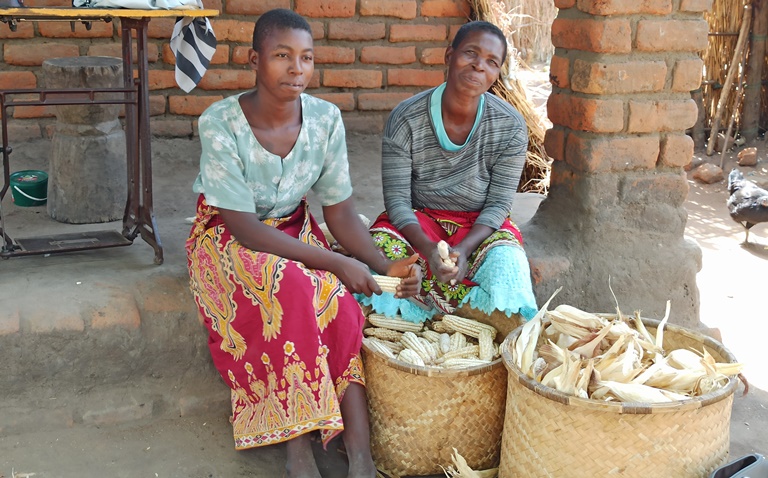Making women-headed families food-secure
Give us this day our daily bread” used to be a daily prayer for 49-year-old Zione Maron from Kagunda Village, Traditional Authority (T/A) Kalonga in Salima District.
She only cared for the meal of that day and working in people’s farms became a daily routine for her to provide for her family.

The mother of eight says her children could not go to school as they had to help her in looking for piecework.
She says: “I have about eight hectares, but I could not farm because inputs were hard to find. My priority was the survival of my family on that particular day.Buying farm inputs was not something I considered.”
Maron says poverty made her make tough decisions, but she never thought of marrying off any of her children.
“I knew time would come for me to have bumper yields and all the problems I faced would disappear,” she says.
As a widow, she focused on how to make her home better despite having to live a ‘hand to mouth’ kind of life.
Her hard work, passion and love for her children forced her to work really hard to make ends meet.
In 2020, Maron says she was lucky to be chosen as a beneficiary of the Kolezani Project, which is being implemented by a Salima-based non-governmental organisation, Kindle Orphan Outreach.
The project seeks to increase food and nutrition security and economic status at house-hold level.
Maron was targeted because she is a single mother taking care of eight children.
She says: “I was taught how to make composite manure which has helped me to increase productivity in my garden. I also rear animals such as goats, pigs and chickens which have been helping me whenever money is needed.”
Maron added that the low cost modern farming technologies have made her family free from hunger and her children now go to school without problems.
“They have no reason to be absent, unless they are sick. Otherwise, economically we are good. We harvest not less than 80 bags of maize now which when sold gives us a lot of money and enough food for the whole year,” she said.
Maron is now an ambassador of change in her community as she engages others on how to make composite manure.
Magret John from the same area commends the work done by Maron, saying she has learnt a lot from her expertise.
She says: “My family now has enough food for the whole year because I learnt how to make composite manure. I do not have a permanent job and so does my husband. We have been failing to buy fertiliser for our four-hectare piece of land, but now we are just applying manure.”
John says she will also share the technology to other women farmers in the area so that they are food-secure.
According to Kindle Orphan Outreach executive director Joseph Kandiyesa, the project seeks to equip households with skills and knowledge in low-cost modern farming technologies to maximise their production.
He says Kolezani Project also targets orphan-headed families, especially where siblings look after themselves or they are being cared for by elderly relatives or grandparents.
Said Kandiyesa: “It is based on the vision of fanning into flame the little bit we have to make it burn brightly! For each of these families, an individualised three-year plan is created, usually involving farm inputs and training that will help the family to be able to care for itself even after the project phases out.
“Most families receive fertiliser, seeds and livestock at various times in the three years, with a gradual weaning from Kindle support as they save money to buy items for themselves. We also have some interventions on revolving principle, including goats on pass-on programme and soya on pay-back programme.”
He says so far, about 90 women have benefited from the project and are trained in livestock production and making composite manure will help sustain the project’s objectives.
Surplus food, mostly maize and rice from the Kolezani Project beneficiaries, is kept at a food bank where the household sells at high prices during critical months, thereby earning more money.
“So far, the highest number of surplus food kept by a household was 65 [50kilogrammes] bags of maize and the minimum of 20 [50kg] bags of maize,” he says.
Ministry of Agriculture spokesperson Gracian Lungu applauded the initiative, saying such activities promote climate smart agriculture and enhance soil fertility.
He says: “These are interventions which the ministry is also promoting. Even those farmers benefitting from Affordable Inputs Programme [AIP] are advised to integrate the use of organic and inorganic fertilisers to maximise their production.
“The ministry, under the Department of Land Resource Management, continues to work hand in hand with our stakeholders, including farmers, to ensure that manure usage is scaled up across Malawi for sustainable agriculture.”
According to Lungu, the ministry has a policy in place where beneficiaries of AIP are encouraged to use manure to complement the little inorganic fertiliser they get through the programme.





